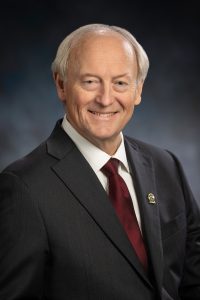Governance & Membership
President's Message - January
Are You Available for Some Conversation?
By D. Kenyon Williams Jr.

2025 OBA President D. Kenyon "Ken" Williams Jr.
“Adapt or perish, now as ever, is nature’s inexorable imperative,” is a quote attributed to H.G. Wells, author of classic science fiction novels. The quotation comes from Mr. Wells’ last book, Mind at the End of Its Tether, an incredibly pessimistic read so unlike some of his other classic science fiction that I enjoyed in my youth, such as The First Men in the Moon, The Time Machine and The Food of the Gods and How It Came to Earth, to name a few. I recall but cannot locate the science fiction novel (loosely based upon Great Britain’s historical forced immigration of convicts to Australia, among other places) in which I first saw an iteration of the quote, i.e., “Adapt or die,” which was a warning given to involuntary immigrants. Both quotations are harsh but instructive.
I was reminded of those quotes while listening to a keynote speaker at the 2014 OBA Annual Meeting. Richard Susskind, an author and futurist, spoke about his 2015 book, Tomorrow’s Lawyers: An Introduction to Your Future. Mr. Susskind was then much more optimistic about the future of the legal profession and has continued to write about his predictions. One of his more recent books, The End of Lawyers?: Rethinking Legal Services, is a bit bleaker. Mr. Susskind predicts that artificial intelligence and other market alternatives will force traditional law firms to adopt such practices or become obsolete. He also views the “more for less” challenge to be a specific threat to the traditional law firm business model. “More for less” is the expectation our clients have that our legal services should be increasingly more efficient at a lower cost to them. An aspect of this client-driven expectation is that clients are increasingly refusing to pay for the training of new lawyers. This client-driven expectation presents multiple problems for law firms but is a real-world example of the necessity of adaptation.
As both Past Presidents Brian Hermanson and Miles Pringle stated in their opening messages to the association, we are going through a time of tremendous change and at a seemingly accelerating pace. I am now serving in my 48th year as an Oklahoma-licensed attorney. Now more than ever, I am worried about the undue influence of politics on the structure of our independent judiciary. I am concerned about the lack of public understanding of the role of the courts in our system of government. I also do not recall a time when access to justice has been more out of the reach of individuals and small businesses than now. I do not recall a time when our rural counties had greater challenges in attracting and retaining new lawyers than now. As a result, my hope and plan for this bar year is for us to have a conversation about these challenges.
I am aware of at least one state where their supreme court conducts remote hearings in different regions of the state for the express purpose of engaging the local populations, students and businesses. They do this to tear away the veil of isolation from the perspective of the general population under which appellate courts operate. Please share with me your thoughts and suggestions regarding how Oklahoma can protect its independent judiciary.
Both the OBA and the Oklahoma Bar Foundation are aware of the “legal deserts” that exist throughout the state. Past President Pringle wrote about legal deserts in his March 2024 message to our association. The Oklahoma Bar Foundation has conducted a survey to better identify and quantify legal needs here in Oklahoma. That survey should be released this year and will hopefully trigger conversations about possible solutions. Our Membership Engagement Committee is working on updates to brochures covering a variety of topics that are focused on the needs of the underserved, such as pro se representation, domestic law and landlord/tenant law, for example. Do we, as an association, need to begin encouraging children at the middle school level to focus on becoming attorneys in their hometowns? Do we need to reach out to local governments of underserved counties and try to collaborate on bringing more lawyers to these areas? What are your suggestions and thoughts regarding this very real issue? Please participate in conversations with your Board of Governors and each other and provide those practical suggestions to me.
As the first lawyer on either side of my family, I take very seriously the honor and responsibility of serving as president of the association for 2025. Executive Director Janet Johnson and our staff are doing an outstanding job of helping me plan and coordinate activities and events for the association in 2025. I am hopeful 2025 will be a year without epic problems to distract us from the areas in which we have chosen to be involved and to serve. I look forward to working with you in our joint goal of preserving the rule of law and educating all who will listen regarding the importance of the rule of law.
For your past and current plans of service, I thank you! If you are looking for new areas of service, please reach out to me, and we will find an area(s) for which your gifts and talents are a fit!
D. Kenyon “Ken” Williams Jr. is a shareholder and director at Hall Estill in Tulsa.
Originally published in the Oklahoma Bar Journal – OBJ 96 Vol 1 (January 2025).
Statements or opinions expressed in the Oklahoma Bar Journal are those of the authors and do not necessarily reflect those of the Oklahoma Bar Association, its officers, Board of Governors, Board of Editors or staff.
